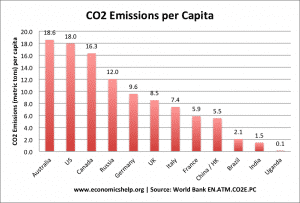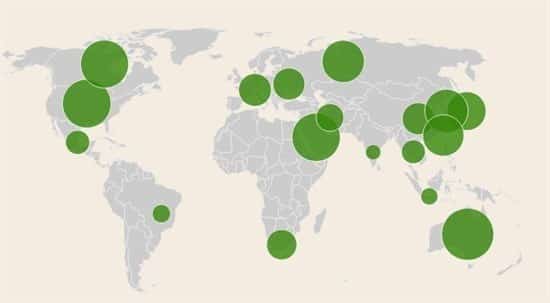GOLD MAN SPEAKS:
In brief: The major plutocrat, Henry “Hank” Paulson, who presided over the 2008 financial crash as Bush’s finance minister, has come strongly in favor of a carbon tax. He compares the on-going climate catastrophe to the worst crash imaginable. After a few arguments of support of my own, I extensively quote this “suppot de Satan” (Satan’s support in Middle Age French). Facing the worst, the devils themselves can come in handy. Nothing below is new on this site, but it’s important to repeat it as a prayer, and hope.
It’s only natural that people clean the mess they make. So carbon polluters ought to pay the poisoning of the atmosphere, and the acidification of the seas. Because they are the ones causing this mess. They have to pay for the destruction they inflict. Not that people in general are innocent. Clearly some countries are living on the hog, not to say like hogs. Here are two views of the CO2 emissions per capita:

Few will argue that life is actually drastically worse in, say, France, in spite of all the carbon pinching there (France has no oil, gas, or coal; and fracking is illegal).
To tax carbon enough for the damage it causes, is the only way to price correctly the activity. Non carbon polluting energies will them be able to compete with the pirates who are attacking the biosphere. For profit.
The world emits 48% more carbon dioxide from the consumption of energy now than it did in 1992 when the first Rio summit took place, and Al Gore went down there with an immense retinue of adulators. To do nothing, but self-glorification.
First notice the astounding economic inefficiency of Anglo-Saxon countries (except for the European United Kingdom which emits less than 9 tons of CO2 per person per year).
FRANCE pollutes with 6 (six) tons of CO2 a year, per person. Germany with 9 tons (nine). The USA with 18 (eighteen) tons per person per year. Canada and Australia are even worse. The European Union, and its half a billion people, is around 7.5 tons of CO2, per year, per person.
As I have explained in the past, it’s no coincidence that the three powers that annihilated the Natives are busy now annihilating the biosphere: it’s the continuation of a mood (that the same, sort of, can be said about Russia is not reassuring, either: the main reason why Putin annexed Crimea is oil and gas in the Black Sea, just off shore).
Can we get out of that spiral from hell? Yes, with a carbon tax. Also please learn that the EU and the USA, together, control most of the world GDP. So they could impose a Carbon Tax. Unilaterally. By force. Yes, force, empire, all that brutish stuff. Evil in the service of goodness. The WTO has agreed already that such a tax-for-the-good is legal in the WTO statutes (the EU, or some of its countries, notably France, already impose carbon taxes, of sorts, in spite of strident USA-China-Russia opposition).
Much of Chinese economic activity is Western industrialized activity, translated to another place. Chinese dumping, say of solar panels could be addressed (in spite of. German(!) opposition; Germans sell luxury cars to the PRC, and in exchange mount cheap solar panels).
The question that the West would be at an economic disadvantage from imposing a carbon tax is a false argument. What is true is that some of the CO2 hogs would have to become more economically active to change radically their socio-economies: more people at work, quality work.
Paulson below says nothing I have not said before, and, often, many times. Yet it’s worth having it in his own words, thus allowing me to eschew the accusation of radical lunatic unreal leftism.
Lessons for Climate Change in the 2008 Recession
By HENRY M. PAULSON Jr. June 21, 2014
THERE is a time for weighing evidence and a time for acting. And if there’s one thing I’ve learned throughout my work in finance, government and conservation, it is to act before problems become too big to manage.
For too many years, we failed to rein in the excesses building up in the nation’s financial markets. When the credit bubble burst in 2008, the damage was devastating. Millions suffered. Many still do.
We’re making the same mistake today with climate change. We’re staring down a climate bubble that poses enormous risks to both our environment and economy. The warning signs are clear and growing more urgent as the risks go unchecked.
This is a crisis we can’t afford to ignore. I feel as if I’m watching as we fly in slow motion on a collision course toward a giant mountain. We can see the crash coming, and yet we’re sitting on our hands rather than altering course.
The solution can be a fundamentally conservative one that will empower the marketplace to find the most efficient response. We can do this by putting a price on emissions of carbon dioxide – a CARBON TAX. Few in the United States now pay to emit this potent greenhouse gas into the atmosphere we all share. Putting a price on emissions will create incentives to develop new, cleaner energy technologies...
I was secretary of the Treasury when the credit bubble burst, so I think it’s fair to say that I know a little bit about risk, assessing outcomes and problem-solving. Looking back at the dark days of the financial crisis in 2008, it is easy to see the similarities between the financial crisis and the climate challenge we now face.
We are building up excesses (debt in 2008, greenhouse gas emissions that are trapping heat now). Our government policies are flawed (incentivizing us to borrow too much to finance homes then, and encouraging the overuse of carbon-based fuels now). Our experts (financial experts then, climate scientists now) try to understand what they see and to model possible futures. And the outsize risks have the potential to be tremendously damaging (to a globalized economy then, and the global climate now).
Back then, we narrowly avoided an economic catastrophe at the last minute by rescuing a collapsing financial system through government action. But climate change is a more intractable problem. The carbon dioxide we’re sending into the atmosphere remains there for centuries, heating up the planet.”
[PA’s warning: It’s worse than that: At least a third goes into the sea, turning it into an acid soda.] Paulson again:
“That means the decisions we’re making today – to continue along a path that’s almost entirely carbon-dependent – are locking us in for long-term consequences that we will not be able change but only adapt to, at enormous cost. To protect New York City from rising seas and storm surges is expected to cost at least $20 billion initially, and eventually far more. And that’s just one coastal city.
When I worry about risks, I worry about the biggest ones, particularly those that are difficult to predict – the ones I call small but deep holes. While odds are you will avoid them, if you do fall in one, it’s a long way down and nearly impossible to claw your way out.
Scientists have identified a number of these holes – potential thresholds that, once crossed, could cause sweeping, irreversible changes. They don’t know exactly when we would reach them. But they know we should do everything we can to avoid them.
Already, observations are catching up with years of scientific models, and the trends are not in our favor.
Fewer than 10 years ago, the best analysis projected that melting Arctic sea ice would mean nearly ice-free summers by the end of the 21st century. Now the ice is melting so rapidly that virtually ice-free Arctic summers could be here in the next decade or two. The lack of reflective ice will mean that more of the sun’s heat will be absorbed by the oceans, accelerating warming of both the oceans and the atmosphere, and ultimately raising sea levels.
Even worse, in May, two separate studies discovered that one of the biggest thresholds has already been reached. The West Antarctic ice sheet has begun to melt. Now that this process has begun, there is nothing we can do to undo the underlying dynamics, which scientists say are “baked in.” . those who claim the science is unsettled or action is too costly are simply trying to ignore the problem. We must see the bigger picture.
.waiting for more information before acting – is actually taking a very radical risk. We’ll never know enough to resolve all of the uncertainties. But we know enough to recognize that we must act now.
We need to craft national policy that uses market forces to provide incentives for the technological advances required to address climate change. As I’ve said, we can do this by placing a tax on carbon dioxide emissions. Many respected economists, of all ideological persuasions, support this approach. We can debate the appropriate pricing and policy design and how to use the money generated. But a price on carbon would change the behavior of both individuals and businesses.
At the same time, all fossil fuel – and renewable energy – subsidies should be phased out. Renewable energy can outcompete dirty fuels once pollution costs are accounted for.
. our failure to act on the underlying problem is deeply misguided, financially and logically.
In a future with more severe storms, deeper droughts, longer fire seasons and rising seas that imperil coastal cities, public funding to pay for adaptations and disaster relief will add significantly to our fiscal deficit and threaten our long-term economic security. So it is perverse that those who want limited government and rail against bailouts would put the economy at risk by ignoring climate change.
This is short-termism. There is a tendency, particularly in government and politics, to avoid focusing on difficult problems until they balloon into crisis. We would be fools to wait for that to happen to our climate…
When it comes to developing new technologies, no country can innovate like America. And no country can test new technologies and roll them out at scale quicker than China.
The two nations must come together on climate. The Paulson Institute at the University of Chicago, a “think-and-do tank” I founded to help strengthen the economic and environmental relationship between these two countries, is focused on bridging this gap.
We already have a head start on the technologies we need. The costs of the policies necessary to make the transition to an economy powered by clean energy are real, but modest relative to the risks.
A tax on carbon emissions will unleash a wave of innovation to develop technologies, lower the costs of clean energy and create jobs as we and other nations develop new energy products and infrastructure. This would strengthen national security by reducing the world’s dependence on governments like Russia and Iran.
Climate change is the challenge of our time. Each of us must recognize that the risks are personal. We’ve seen and felt the costs of underestimating the financial bubble. Let’s not ignore the climate bubble.
Henry M. Paulson Jr., an ex-football player, is the chairman of the Paulson Institute at the University of Chicago, was CEO of Golman-Sachs, and secretary of the Treasury from July 2006 to January 2009. When Satan himself is melting, the heat is on.
Patrice Ayme






